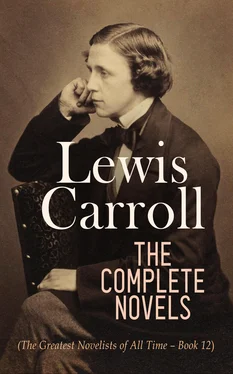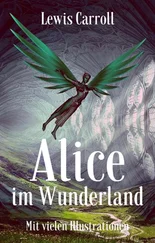‘I’ll tell thee everything I can;
There’s little to relate.
I saw an aged aged man,
A-sitting on a gate.
“Who are you, aged man?” I said,
“and how is it you live?”
And his answer trickled through my head
Like water through a sieve.
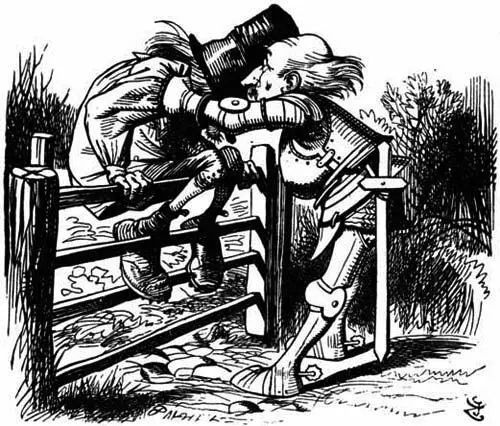
He said “I look for butterflies
That sleep among the wheat:
I make them into mutton-pies,
And sell them in the street.
I sell them unto men,” he said,
“Who sail on stormy seas;
And that’s the way I get my bread—
A trifle, if you please.”
But I was thinking of a plan
To dye one’s whiskers green,
And always use so large a fan
That they could not be seen.
So, having no reply to give
To what the old man said,
I cried, “Come, tell me how you live!”
And thumped him on the head.
His accents mild took up the tale:
He said “I go my ways,
And when I find a mountain-rill,
I set it in a blaze;
And thence they make a stuff they call
Rolands’ Macassar Oil—
Yet twopence-halfpenny is all
They give me for my toil.”
But I was thinking of a way
To feed oneself on batter,
And so go on from day to day
Getting a little fatter.
I shook him well from side to side,
Until his face was blue:
“Come, tell me how you live,” I cried,
“And what it is you do!”
He said “I hunt for haddocks’ eyes
Among the heather bright,
And work them into waistcoat-buttons
In the silent night.
And these I do not sell for gold
Or coin of silvery shine
But for a copper halfpenny,
And that will purchase nine.
“I sometimes dig for buttered rolls,
Or set limed twigs for crabs;
I sometimes search the grassy knolls
For wheels of Hansom-cabs.
And that’s the way” (he gave a wink)
“By which I get my wealth—
And very gladly will I drink
Your Honour’s noble health.”
I heard him then, for I had just
Completed my design
To keep the Menai bridge from rust
By boiling it in wine.
I thanked him much for telling me
The way he got his wealth,
But chiefly for his wish that he
Might drink my noble health.
And now, if e’er by chance I put
My fingers into glue
Or madly squeeze a right-hand foot
Into a left-hand shoe,
Or if I drop upon my toe
A very heavy weight,
I weep, for it reminds me so,
Of that old man I used to know—
Whose look was mild, whose speech was slow,
Whose hair was whiter than the snow,
Whose face was very like a crow,
With eyes, like cinders, all aglow,
Who seemed distracted with his woe,
Who rocked his body to and fro,
And muttered mumblingly and low,
As if his mouth were full of dough,
Who snorted like a buffalo—
That summer evening, long ago,
A-sitting on a gate.’
As the Knight sang the last words of the ballad, he gathered up the reins, and turned his horse’s head along the road by which they had come. ‘You’ve only a few yards to go,’ he said, ‘down the hill and over that little brook, and then you’ll be a Queen—But you’ll stay and see me off first?’ he added as Alice turned with an eager look in the direction to which he pointed. ‘I sha’n’t be long. You’ll wait and wave your handkerchief when I get to that turn in the road? I think it’ll encourage me, you see.’
‘Of course I’ll wait,’ said Alice: ‘and thank you very much for coming so far—and for the song—I liked it very much.’
‘I hope so,’ the Knight said doubtfully: ‘but you didn’t cry so much as I thought you would.’
[•] So they shook hands, and then the Knight rode slowly away into the forest. ‘It wo’n’t take long to see him off , I expect,’ Alice said to herself, as she stood watching him. ‘There he goes! Right on his head as usual! However, he gets on again pretty easily—that comes of having so many things hung round the horse—’ So she went on talking to herself, as she watched the horse walking leisurely along the road, and the Knight tumbling off, first on one side and then on the other. After the fourth or fifth tumble he reached the turn, and then she waved her handkerchief to him, and waited till he was out of sight.
[•] ‘I hope it encouraged him,’ she said, as she turned to run down the hill: ‘and now for the last brook, and to be a Queen! How grand it sounds!’ A very few steps brought her to the edge of the brook. ‘The Eighth Square at last!’ she cried as she bounded across, *
and threw herself down to rest on a lawn as soft as moss, with little flower-beds dotted about it here and there. ‘Oh, how glad I am to get here! And what is this on my head?’ she exclaimed in a tone of dismay, as she put her hands up to something very heavy, and fitted tight all round her head.
‘But how can it have got there without my knowing it?’ she said to herself, as she lifted it off, and set it on her lap to make out what it could possibly be.
It was a golden crown.
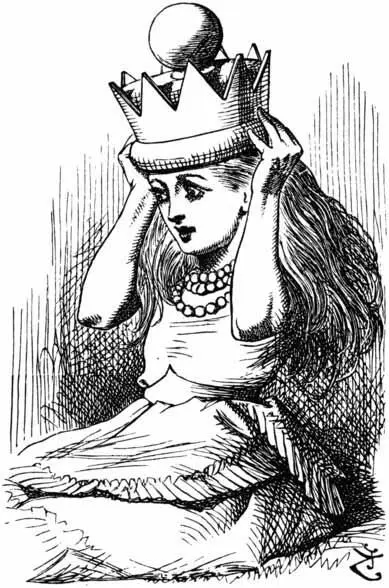
Table of Contents
‘W ell , this is grand!’ said Alice. ‘I never expected I should be a Queen so soon—and I’ll tell you what it is, your majesty,’ she went on in a severe tone (she was always rather fond of scolding herself), ‘it’ll never do for you to be lolling about on the grass like that! Queens have to be dignified, you know!’
So she got up and walked about—rather stiffly just at first, as she was afraid that the crown might come off: but she comforted herself with the thought that there was nobody to see her, ‘and if I really am a Queen,’ she said as she sat down again, ‘I shall be able to manage it quite well in time.’
[•] Everything was happening so oddly that she didn’t feel a bit surprised at finding the Red Queen and the White Queen sitting close to her, one on each side: she would have liked very much to ask them how they came there, but she feared it would not be quite civil. However, there would be no harm, she thought, in asking if the game was over. ‘Please, would you tell me—’ she began, looking timidly at the Red Queen.
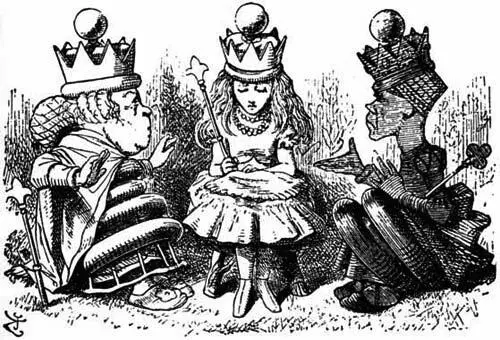
‘Speak when you’re spoken to!’ the Queen sharply interrupted her.
‘But if everybody obeyed that rule,’ said Alice, who was always ready for a little argument, ‘and if you only spoke when you were spoken to, and the other person always waited for you to begin, you see nobody would ever say anything, so that—’
‘Ridiculous!’ cried the Queen. ‘Why, don’t you see, child—’ here she broke off with a frown, and, after thinking for a minute, suddenly changed the subject of the conversation. ‘What do you mean by “If you really are a Queen”? What right have you to call yourself so? You ca’n’t be a Queen, you know, till you’ve passed the proper examination. And the sooner we begin it, the better.’
‘I only said “if”!’ poor Alice pleaded in a piteous tone.
The two Queens looked at each other, and the Red Queen remarked, with a little shudder, ‘She says she only said “if”—’
Читать дальше
